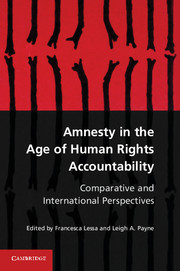Book contents
- Frontmatter
- Contents
- Contributors
- Foreword
- Acknowledgments
- Introduction
- Part I Theoretical Framework
- Part II Comparative Case Studies
- 3 Amnesties’ Challenge to the Global Accountability Norm?
- 4 From Amnesty to Accountability
- 5 Barriers to Justice
- 6 Resistance to Change
- 7 De Facto and De Jure Amnesty Laws
- 8 Creeks of Justice
- 9 Accountability through Conditional Amnesty
- 10 De Facto Amnesty?
- 11 A Limited Amnesty?
- 12 The Spanish Amnesty Law of 1977 in Comparative Perspective
- Conclusion Amnesty in the Age of Accountability
- Bibliography
- Index
- References
10 - De Facto Amnesty?
The Example of Post-Soeharto Indonesia
Published online by Cambridge University Press: 05 June 2012
- Frontmatter
- Contents
- Contributors
- Foreword
- Acknowledgments
- Introduction
- Part I Theoretical Framework
- Part II Comparative Case Studies
- 3 Amnesties’ Challenge to the Global Accountability Norm?
- 4 From Amnesty to Accountability
- 5 Barriers to Justice
- 6 Resistance to Change
- 7 De Facto and De Jure Amnesty Laws
- 8 Creeks of Justice
- 9 Accountability through Conditional Amnesty
- 10 De Facto Amnesty?
- 11 A Limited Amnesty?
- 12 The Spanish Amnesty Law of 1977 in Comparative Perspective
- Conclusion Amnesty in the Age of Accountability
- Bibliography
- Index
- References
Summary
In Indonesia, unlike the other cases discussed in this volume, efforts to introduce formal amnesties for perpetrators of gross human rights violations have not succeeded. But the purpose that such amnesties have served elsewhere – to protect those responsible for mass human rights violations and suppress the truth about the past – has been achieved. Despite failing to adopt an official amnesty law, Indonesia does not represent a case of “doing nothing.” On the contrary, in response to a long list of cases of mass violations of human rights, successive Indonesian governments have passed a plethora of laws, established specialized human rights courts and other mechanisms, created commissions of inquiry, undertaken a range of investigations, and completed trials.
A cumulative analysis of these various attempts to achieve a level of truth and justice, however, provides a striking pattern of failure. Not one senior officer or official has been held accountable despite scores of events in which the national security forces have been implicated in serious violations, including at least seven separate cases of systematic violence in which more than 1,000 civilians lost their lives, over a dozen commissions of inquiry, and the trial of thirty-four individuals before the human rights courts. Although progressive forces in Indonesia can claim significant victories in advancing human rights, reports of serious violations persist and little progress has been made in the areas of truth and accountability.
- Type
- Chapter
- Information
- Amnesty in the Age of Human Rights AccountabilityComparative and International Perspectives, pp. 263 - 290Publisher: Cambridge University PressPrint publication year: 2012
References
- 2
- Cited by

